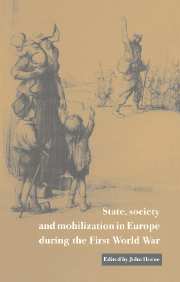Book contents
- Frontmatter
- Contents
- List of contributors
- Preface
- 1 Introduction: mobilizing for ‘total war’, 1914–1918
- I National ideals
- 2 German artists, writers and intellectuals and the meaning of war, 1914–1918
- 3 Children and the primary schools of France, 1914–1918
- 4 War, ‘national education’ and the Italian primary school, 1915–1918
- II Solidarities and minorities
- III Army and nation
- IV The limits and consequences of mobilization
- Notes
- Index
3 - Children and the primary schools of France, 1914–1918
Published online by Cambridge University Press: 04 December 2009
- Frontmatter
- Contents
- List of contributors
- Preface
- 1 Introduction: mobilizing for ‘total war’, 1914–1918
- I National ideals
- 2 German artists, writers and intellectuals and the meaning of war, 1914–1918
- 3 Children and the primary schools of France, 1914–1918
- 4 War, ‘national education’ and the Italian primary school, 1915–1918
- II Solidarities and minorities
- III Army and nation
- IV The limits and consequences of mobilization
- Notes
- Index
Summary
From 1914 to 1918, the concept of a ‘war for children’ was continuously preached by the adult world. Presented to children as a war to protect their safety, the conflict was also portrayed as a war to build the future – their future. In such circumstances, the pressure exerted on children from the outset was extremely heavy.
Schools as a mobilizing force
These adult demands on childhood during the war were particularly evident in the world of education. In effect, the war added an additional burden to the classic aims of the school system and reinforced the traditional mechanisms for imposing responsibility on childhood. The soldier's duty on the battlefield was a beacon of inspiration that was referred to regularly and constantly emphasized in defining the duty to work in the classroom. The traditional demands of the republican schoolroom drew fresh moral sustenance from the war. At the beginning of the new school year in September 1914, the headmaster of a Paris school wrote a brief injunction in his pupils' notebooks which, significantly, linked schoolwork and patriotic duty. ‘At this time each of us must perform his duty to the utmost. The duty of schoolchildren is to be obedient, hardworking, to prepare a sound future for themselves … This is how they can serve the nation for which their elders are fighting with such heroism.’ The teachers' professional journal, the Revue de l'enseignement primaire, compared schoolwork even more straightforwardly to action on the battlefield: ‘To work, young friends! – or rather, to battle, for you too are already engaged in the struggle.’
- Type
- Chapter
- Information
- Publisher: Cambridge University PressPrint publication year: 1997
- 4
- Cited by



